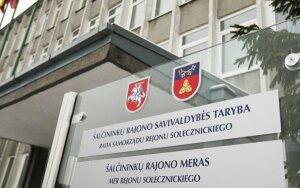- November 22, 2012
- 236
There is no true self-governance in Lithuania

Is Šalčininkai district municipality only a recreational and tourist region? Is it worth developing other fields of economy here? These issues were discussed during a conference in Šalčininkai titled “Šalčininkai 2013: Possibilities of Employment and Business” [Polish: Soleczniki 2013: Możliwości zatrudnienia i biznesu] which gathered representatives of local business, politics, education and media.
“The economic policy should be based on providing profitable conditions for effectively working business entities.” said Prof. Bogusław Grużewski. He added that searching for new investment objects is extremely important.
Lack of self-governance
The participants of the conference tried to answer the question of how the economic and investment situation of the region could be improved. Many people mentioned the issue of the bad economic condition of the region. It was said that one of the reason of this phenomenon is lack of self-governance in Lithuania. “I have been living in Mažeikiai for some time. There I encountered the same problems as in Šalčininkai. Except for the issue of employment, big enterprises do not have any great influence on the situation of the region because the major part of taxes goes to the state. There is no true self-governance in Lithuania.” said Jacek Komar, a well-known in Lithuania journalist. According to the participants of the conference, there should be close cooperation between the local government and business sphere. “The cooperation between the local government and business sphere must be based on a situation in which taxes do not go to the state but stay in the local government.” said Danas Arlauskas, a representative of Lithuanian Confederation of Business Employers [Polish: Konfederacja Przedsiębiorców Litwy].
Where will we find employees?
According to some representatives of Šalčininkai district municipality, the local people are hard-working and resourceful, however, several participants of the conference did not agree with this statement. “We agree with the need of investments but where will we find employees? The local people are no longer used to work. Those who really want to work decide to migrate. Lithuania paid the highest price for the entry into the EU, it paid in its own citizens.” claimed Władimir Kot, an owner of a local newspaper.
Representatives of the local authorities tried to justify the situation with a fact that Šalčininkai district municipality has always been an agricultural region, however, experts and representatives of the European Commission did not support that statement.
“If we compare remunerations in different local governments, we will see that Vlinius takes first place (2 600 LTL) and Šalčininkai is in last place (1 500 LTL). Between Vilnius and Šalčininkai there are other local governments which receive higher remuneration. The situation is mainly caused by the fact that in particular local governments there used to be factories focused on export.” stressed a certain participant of the conference.
Other financial sources
The meeting was organised by the European Commission Representation in Lithuania. The representatives of the Commission emphasised that it was worth searching for financial sources not only in the governmental structures. “The Ministry of Economy is not the only one available financial source. A few months ago I participated in an event during which the region received the Honorary Flag of the Council of Europe. I realized that the region had been actively cooperating with different partners from Europe. We should probably look for investments there.” said Giedrius Sudikas, a director of the Media and Information Section of the European Commission Representation in Lithuania [Polish: Dział Mediów i Informacji przedstawicielstwa Komisji Europejskiej na Litwie].
According to a female participant of the conference who lives in Šalčininkai, not only does the wrong policy of the government negatively influence the economic situation of the region, but also the attitude of the media. The media presents Šalčininkai district municipality only in the context of the Polish-Lithuanian conflict.
A public opinion survey has been conducted in Šalčininkai district municipality. According to it, 4 of 5 respondents think that the region should focus mainly on the development of industry. 60% of respondents claims the local authorities should develop and create conditions for small and medium enterprises. According to the citizens, the business conditions in the region are not perfect but they generally consider them to be positive. The respondents agrees that Šalčininkai does not fully use its tourist potential.
Source: http://pl.delfi.lt/biznes/biznes/na-litwie-nie-ma-prawdziwej-samorzadnosci.d?id=60050489
Tłumaczenie Karolina Rolka w ramach praktyk w Europejskiej Fundacji Praw Człowieka, www.efhr.eu. Translated by Karolina Rolka the framework of a traineeship programme of the European Foundation of Human Rights, www.efhr.eu.

